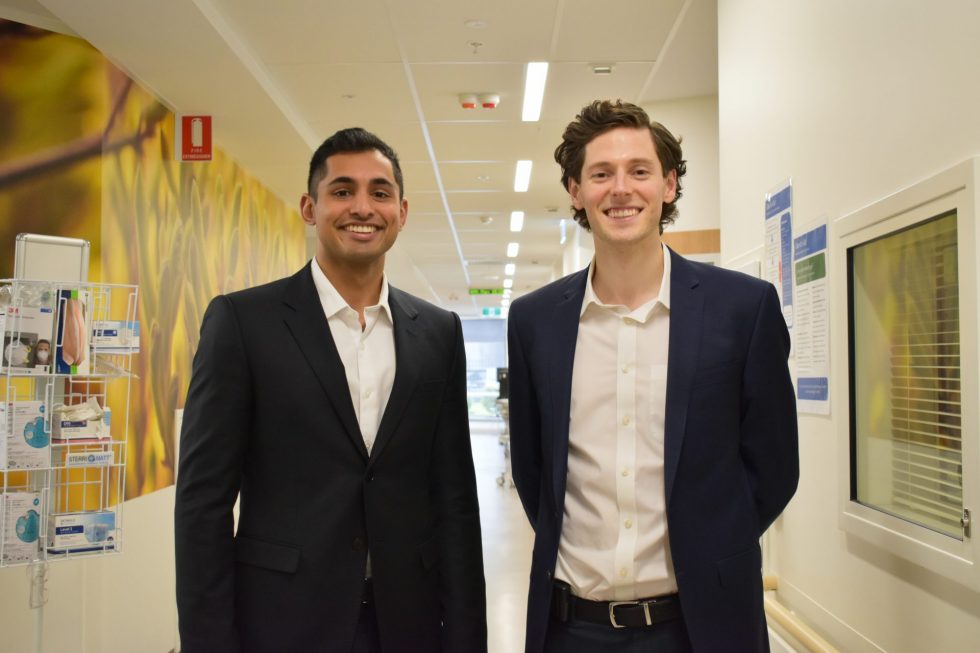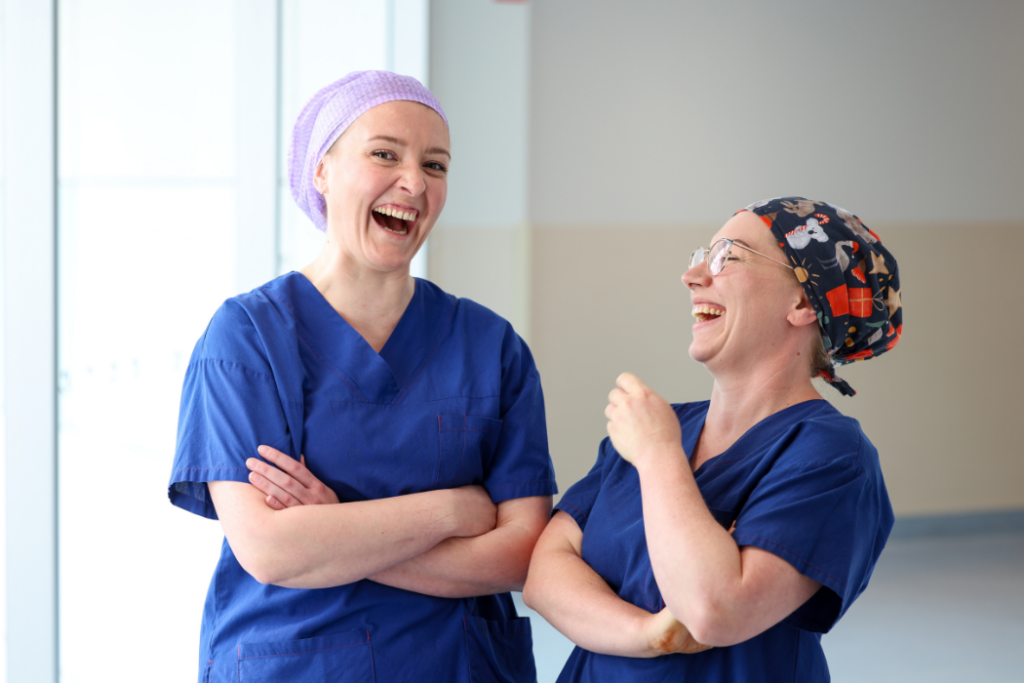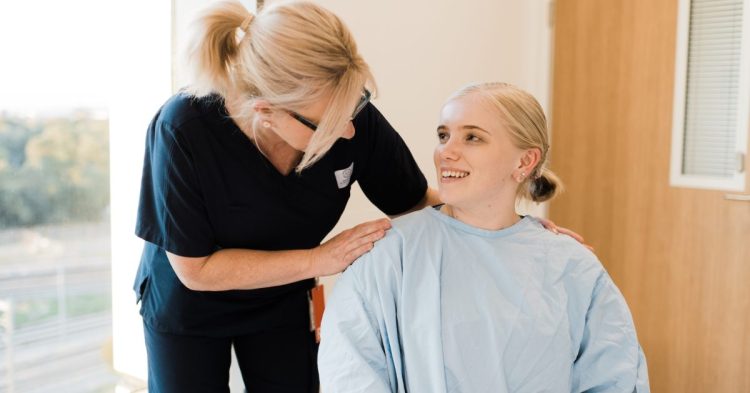South Australia’s latest medical game-changer isn’t a new pill – it’s an AI system built by two young Adelaide doctors that’s helping free up beds in our hospitals.
If you’ve ever sat in a hospital bed waiting (and waiting… and waiting) to be discharged, you’ll know the struggle. Even when you’re feeling well and the doctor declares you’re good to go, the paperwork, follow-up organisation, and logistics can drag out for hours.
Enter the Adelaide Score – a breakthrough AI system that assigns each patient a daily discharge likelihood (from 1 to 100 per cent), helping hospitals reduce wait times and streamline the process.

The doctors improving hospital care with AI
The minds behind it are Dr Stephen Bacchi, a 32-year-old neurologist and associate professor at the University of Adelaide, and Dr Joshua Kovoor, a 28-year-old general surgery principal house officer and University of Adelaide affiliate.
Both have been recognised as international rising stars in their fields, each earning a prestigious Fulbright Future Scholarship – Stephen for his work in AI-driven neurology research at Harvard University, and Josh for his research on AI and robotic surgery at Cedars-Sinai Medical Center in Los Angeles.
Though they work in different specialties, both bring a unique perspective to solving hospital inefficiencies.
For Stephen, the brain is endlessly fascinating. “It’s the most interesting thing in the universe,” he says. “It’s how we experience music, art, and everything that makes us human.”
Josh, meanwhile, thrives on the problem-solving nature of surgery. “I like the ability to definitively solve problems, and general surgery gives me the broadest range of them to tackle.”
Their paths may have been different, but their goal is the same: making hospitals more efficient, medical staff more supported and high-quality patient care more effective.
From a hospital dinner chat to world-first innovation
Like many great ideas, this one started with a conversation between tired – but brilliant – doctors looking to make things better.
“After a long shift, Josh, another junior doctor, Brandon Stretton, and I were having dinner in the hospital, talking about some of the processes we’d dealt with that day and how we could improve them,” Stephen says. “We thought AI could help.”
And help it has. One of the most significant ways the Adelaide Score has made an impact is through its integration with the Lyell McEwin Hospital’s SWIFT team. This team of health professionals is designed to speed up weekend discharges and get patients home sooner.
By incorporating the Adelaide Score’s knowledge about when patients might go home, the AI-enhanced team – TAILORED SWIFT (pun totally intended by Stephen) – has helped ease bottlenecks and improve hospital efficiency.
“A lot of the time, people aren’t stuck in hospital because of their health – they’re waiting for non-medical tasks such as administrative organisation,” says Josh. “The Adelaide Score predicts when someone will be ready to go home so planning can start sooner.”
How SA’s AI is setting a global healthcare standard
The name “Adelaide Score” wasn’t just a throwaway decision either. “We wanted to highlight that Adelaide, and South Australia more broadly, are at the cutting edge of healthcare AI on both the national and international stage,” Josh says.
Another key decision was making sure the system wasn’t locked into just one hospital. “We purposely designed it using objective information – blood tests, vital signs – so it could work in hospitals anywhere in the world”.
Despite both having international opportunities in the US, they’re committed to bringing their expertise back to South Australia.
“Now is a unique time to be doing AI research,” Stephen says. “In particular, we believe this technology can have a great impact in South Australia.”
Josh agrees. “We want to put Adelaide on the global healthcare AI stage. This is world-class health research, and there’s no reason why South Australia can’t lead the way.”
The impact of the Adelaide Score and its integration into TAILORED-SWIFT isn’t just anecdotal – it’s backed by Stephen and Josh’s peer-reviewed research that’s gaining global attention in medical journals.
Trials at Lyell McEwin Hospital show it reduces hospital stays, cuts readmissions, and is projected to save $9.5 million in bed costs annually. Already rolling out across SA, it’s set to expand interstate within 12-18 months.

AI’s next big moves in SA healthcare
The Adelaide Score is just the start. AI is popping up in hospitals across South Australia in ways you might not expect:
- Predicting patient deterioration – AI analyses vital signs to flag when someone’s condition is worsening. (Currently in trials)
- De-labelling penicillin allergies – Turns out, many people think they’re allergic but aren’t. AI is helping doctors figure that out. (Already in use in multiple SA hospitals)
- Robotic surgery – AI-assisted precision is improving surgical outcomes. (Already in action and evolving fast)
- Bridging gaps and decreasing metro-regional health inequity – AI could be a game-changer for rural healthcare where staff and resource shortages are an issue. “That’s a major focus for us moving forward,” Josh says. (On the horizon)
AI: Your doctor’s new sidekick, not their replacement
If you’re picturing a future where robots replace doctors, relax. Josh and Stephen are very clear: AI isn’t here to take over – it’s here to help.
“We have an incredible healthcare system, but it’s under a lot of pressure,” Stephen says. “AI can relieve some of that so clinicians can focus on what they do best – caring for people.”
Stephen envisions AI playing a key role in improving hospital visits right from the start. One of his next projects explores how AI could engage with patients in the waiting room, gathering essential data to streamline diagnosis and admission.

Why South Australians should pay attention
Whether you’re into tech, medicine, or just keen on career opportunities in a booming field, AI in healthcare is the place to be. And the best part? You don’t have to leave Adelaide to be part of it.
“It doesn’t matter if you’re in high school, at university, or already working – there are ways to get involved because this field is moving fast,” Stephen says.
With Adelaide leading the charge in AI-powered healthcare, there’s never been a better time to join the revolution.
Interested in a hi-tech or medical career? Find out more about SA’s jobs of the future and training pathways here.

















